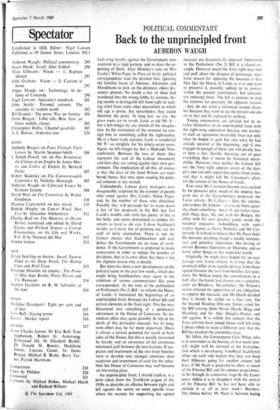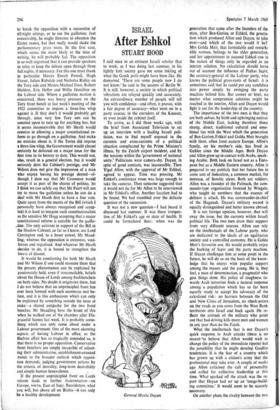Back to the unprincipled front
POLITICAL COMMENTARY AUBERON WAUGH
Left-wing revolts against the Government now conform to a rigid pattern, and so does the re- porting of them. After Monday's vote on Mrs Castle's White Paper In Place of Strife, political correspondents read the division lists, ignoring the familiar litany of Atkinses, Atkinsons and Mendelsons to pick on the dimmest, oldest dis- senters present. No doubt a few of these had wandered into the wrong lobby by mistake, be- ing unable to distinguish left from right or seek- ing relief from some other discomfort to which old age is prone, but nevertheless they could illustrate the point. At long last, we cry, the grass roots are in revolt. Look at old Mr X— not a left-winger by any stretch of the imagina- tion. In the excitement of the moment we con- sign him to something called the right-centre. He is a Scots trade unionist. Look at wonderful Mr Y—so sprightly for his ninety-seven years. Again, no left-winger he, but a Midlands Non- conformist. Between the two of them, they represent the soul of the Labour movement, and here they are voting against their own gov- ernment. The implication of all this, of course, is that the days of the fiend Wilson are num- bered; hence, that time spent reading the politi- cal columns is not wasted.
Undoubtedly. Labour party managers were disagreeably surprised by the number of people who voted against Mrs Castle's White Paper, and, by the number of those who abstained. Possibly they will persuade her to water down a few of her proposals in the Bill, but Ted Castle's trouble and strife has plenty of fire in her belly, and seems determined to clobber the unions as hard as she can. Labour backbench revolts, as I never tire of pointing out, are the stuff of daily journalism. There is not the faintest chance that backbenchers will ever defeat the Government on an issue of confi- dence. If the Government is prepared to make concessions in order to reduce the number of dissidents, that is its own affair, but there is not the slightest reason why it should.
But there has been a new development on the political scene in the past few weeks, which just might bring backbenchers once again to the attention of serious commentators like your correspondent. At the time of the publication of Parliament (No 2) Bill—to reform the House of Lords—I mentioned the beginnings of an unprincipled front, between the Labour left and certain elements in the Tory right. This has now blossomed into something of a permanent adornment in the House of Commons. Its im- mediate effect may quite possibly be felt in the death of this particular measure, but its long- term effect may be far more important. There is always a certain potential for revolt in both sides of the House, but this is usually restrained by loyalty and an awareness of the enormous emotional gulf between the two factions. If sus- picion and resentment of the two front benches were to develop into stronger emotions than suspicion and resentment of each for the other, then the House of Commons may well become an interesting place.
An unprincipled front, I should explain, is a term taken from the Trotskyite jargon of the 1930s to describe an alliance between right and left against the centre on some specific issue where the reasons for supporting the agreed measure are diametrically opposed. Opposition to the Parliament (No 2) Bill is a classic ex- ample. However much the Tory right may huff and puff about the dangers of patronage, their basic reason for opposing the measure is that they like the House of Lords as it is and want to preserve it, possibly adding to its powers within the present constitution, but certainly not reducing them. The left is anxious to stop the reforms for precisely the opposite reasons --they do not want a reformed second cham- ber because they want to see the present one die on its feet and be replaced by nothing.
Young communists are advised not to in- volve themselves in an unprincipled front with the right-wing opposition because one partner in such an agreement invariably loses not only what he hoped to gain but also what he had already secured at the beginning; and if one engages in enough of them, one will plainly lose at least a few, thereby throwing out of gear. everything that is meant by historical inevit- ability. However since neither the Labour left nor the Tory right appears aware of the clan; gers, one can only report that such a front exists, and that it might kill Mr Crossman's plans for the reform of the House of Lords.
Ever since Mr Crossman became over-excited by his pensions plan, much of the impetus has gone out of the Government's proposals for Lords reform. Mr Callago.1 n likes the scheme, and so does Mr Jenkins- -lice to see them agree- ing about something—but hod, are rather occu- pied these days, the one with his Budget, the other with his own peculiar games inside the national executive, hobnobbing with such b, mighty figures as Harry Nicholas and Mr Cat- termole. It is hard to believe that Mr Peart finds the measure anything except a totally unneces- sary and pointless imposition, like having to answer Business Questions on Thursday and so many other things in this imperfect world.
Originally, he might have hoped for an easy passage over Lords reform. It is true that the proposals differ in no significant way from those agreed between the two front benches last year, when Mr Wilson ended the consultations in a huff after the Lords had thrown out a sanctions order on Rhodesia. Nevertheless. Mr Wilson's action relieved the opposition of any obligation to support the measure, and Mr Heath decided that it should be settled on a free vote. On the Second Reading fifty-one Tories voted for the Bill (among them Messrs Heath, Hogg and Maudling and Sir Alec Douglas-Home) and 105 against. It is within this context that the Tory activists have joined forces with left-wing Labour rebels to stage a filibuster now that the Bill has reached the committee stage.
Mr Silkin, the Government Chief Whip, who is in remainder to the barony of that name him- self, might well be alarmed at the fraternisa- tion which is developing. Unofficial backbench whips on each side reckon that they can keep their filibuster going for another sixteen full days, if Mr Peart is prepared to allow as much of the Finance Bill and the summer programme; to be through its committee stage by the Easter recess unless it is to disappear with the arrival of the Finance Bill; be has not been able to include it at all in next week's Business. The choice before Mr Peart is between trying to break the opposition with a succession of all-night sittings, or to use the guillotine. Just conceivably, he might threaten to abandon the Easter recess, but that really would shake the parliamentary grass roots. In the first case, which seems the more likely at the time of writing, he will probably fail. The opposition is so well organised that it can provide speakers in relay to keep the debate open through three full nights, if necessary. For this one must thank•in particular Messrs Enoch Powell, Hugh Fraser, Julian Ridsdale and Nicholas Ridley on the Tory side and Messrs Michael Foot, Robert Sheldon, Eric Heifer and Willie Hamilton on the Labour side. Where a guillotine motion is concerned, there was heavy pressure on the Tory front bench at last week's meeting of the 1922 committee to impose a three-fine whip against it. If they don't it would probably get through, since very few Tory mPs can be counted upon to turn up for anything less, but it seems inconceivable that Mr Heath would connive in allowing a major constitutional re- form to go through on a guillotine. And make no mistake about it, if the Tories did impose a three-line whip, the Government would almost certainly be defeated on a major issue for the first time in its history to date. This would not, alas, result in a general election, but it would seriously dent the Cabinet's prestige, and Mr Wilson does not give the impression of a man who enjoys having his prestige dented—al- though I dare say that Mr Crossman would accept it as part of the charm of polities. So I think we can safely say that Mr Peart will not try to move the guillotine unless he can do a deal with Mr Heath first to have a free vote. Quite apart from the merits of the Bill (which I personally have always recognised and accep- ted) it is hard to imagine such constitutionalists as the sensitive Mr Hogg accepting that a major constitutional reform is suitable for the guillo- tine. The only activists in support of the Bill in the Shadow Cabinet, so far as I know, are Lord Carrington and, to a lesser extent, Mr Maud- ling; whereas the opposition is extensive, voci- ferous and orgafiised. And whatever Mr Heath decides to do, it is bound to strengthen the forces of dissent.
It would be comforting for both Mr Heath and Mr Wilson if one could reassure them that the present phenomenon can be explained by passionately held, even if irreconcilable, beliefs about the House of Lords among backbenchers on both sides. No doubt it originates there, but I do not believe that an unprincipled front has ever been formed with such enormous zest be- fore, and it is this enthusiasm which can only be explained by something outside the issue at stake—a shared antipathy for the two front benches. Mr Maudling bore the brunt of this when he walked out of the chamber after Dis- graceful Scenes last week. It is probably some- thing which can only come about under a Labour government. One of the most alarming aspects of having Labour in office, as the Biafran affair has so tragically reminded us, is that there is no proper opposition. C9nservative front benchers are simply incapable of adjust- ing their administrative, establishment-oriented minds to the broader outlook which opposi- tion demands, judging government actions by the criteria of morality, long-term desirability and simple human benevolence. • If the present unprincipled front on Lords reform leads to further fraternisation—on Europe, NAFTA, East of Suez, fluoridation, what you will, but above all on Biafra—it can only be a healthy development.



































 Previous page
Previous page